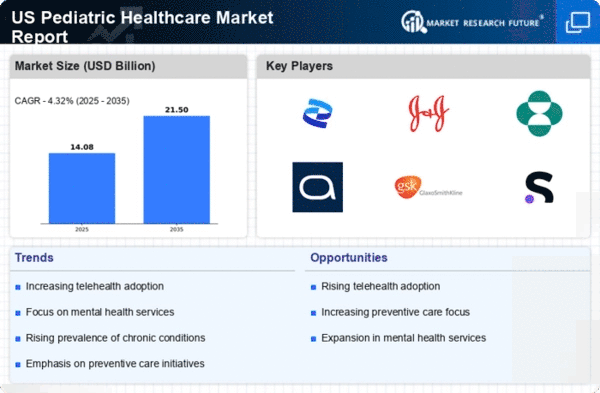Rising Pediatric Population
Experiencing growth due to the increasing number of children in the United States.. According to the U.S. Census Bureau, the population of children under 18 years is projected to reach approximately 73 million by 2025. This demographic shift necessitates enhanced healthcare services tailored to the unique needs of children. As the pediatric population expands, healthcare providers are likely to invest more in specialized pediatric services, thereby driving the market forward. The demand for pediatric healthcare services is expected to rise, leading to increased funding and resources allocated to this sector. Consequently, the pediatric healthcare market is poised for significant growth as stakeholders respond to the evolving needs of a larger pediatric population.
Increased Focus on Preventive Care
There is a growing emphasis on preventive care within the pediatric healthcare market, driven by the recognition of its long-term benefits. Healthcare providers are increasingly advocating for regular check-ups, vaccinations, and early screenings to identify potential health issues before they escalate. The Centers for Disease Control and Prevention (CDC) recommends that children receive a series of vaccinations by age two, which has contributed to a rise in preventive healthcare services. This shift towards preventive care is likely to enhance the overall health of the pediatric population, reduce healthcare costs in the long run, and foster a more proactive approach to child health. As a result, Expected to expand as more resources are allocated to preventive services..
Policy Changes and Healthcare Reforms
Recent policy changes and healthcare reforms are significantly impacting the pediatric healthcare market. Legislative efforts aimed at improving access to healthcare for children, such as the Children's Health Insurance Program (CHIP), have expanded coverage for millions of children in the United States. These reforms are likely to increase the demand for pediatric healthcare services as more families gain access to necessary care. Additionally, initiatives promoting value-based care are encouraging healthcare providers to focus on quality outcomes rather than volume, which may lead to improved care coordination and patient satisfaction. As these policies continue to evolve, they are expected to shape the landscape of the pediatric healthcare market, fostering an environment conducive to growth and innovation.
Technological Advancements in Healthcare
Technological innovations are transforming the pediatric healthcare market, enhancing the quality and accessibility of care. The integration of advanced medical devices, telehealth solutions, and electronic health records (EHR) systems is becoming increasingly prevalent. For instance, the American Academy of Pediatrics has noted that telemedicine usage among pediatricians has surged, with over 60% of pediatricians reporting its implementation in their practices. These advancements not only improve patient outcomes but also streamline operations within healthcare facilities. As technology continues to evolve, it is likely to play a pivotal role in shaping the pediatric healthcare market, facilitating better communication between healthcare providers and families, and ultimately leading to improved healthcare delivery for children.
Growing Awareness of Pediatric Mental Health
Witnessing a heightened awareness of mental health issues. affecting children and adolescents. Recent studies indicate that approximately 1 in 6 children aged 2-8 years has a diagnosed mental, behavioral, or developmental disorder. This growing recognition has prompted healthcare providers to prioritize mental health services within pediatric care. Schools and community organizations are increasingly collaborating with healthcare professionals to address mental health needs, leading to a more integrated approach to child health. As mental health becomes a focal point in pediatric care, the market is likely to see an increase in funding and resources dedicated to mental health services, thereby enhancing the overall quality of care for children.
















